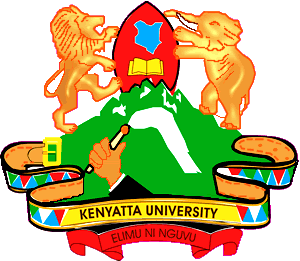Most employers rely on the solid foundation of a job seeker's academic credentials. Certification is reserved for Kenyatta University. After completions of the civil engineering course, the student will be issued with a degree certificate bearing the name 'Bachelor of Science (BSc.) in Civil Engineering'. However, to become a professional engineer, the graduate will be required to undertake the process of registration with the Engineers' Board of Kenya (EBK).
Program Structure and Duration
The programme is designed so that a student completes the degree in a period of five academic years. Throughout the course of study, the student is expected to take a minimum of 16 units in any given year of study. To qualify for the award of the degree, the candidate should have taken a minimum of 80 units of which 77 are compulsory and three (3) are electives.
To facilitate hands on practical experiences, Civil Engineering students shall have a third semester
in second, third and fourth years in conformity with the requirements of the Engineering Board of Kenya (EBK). During the second year third semester, the students will undertake a compulsory practical attachment while during the third and fourth years, they will undertake compulsory industrial attachments.
A semester shall consist of sixteen (16) weeks two (2) of which are for examination. The teaching
hours for each practical unit shall be two (2) hours lecture, one (1) hour tutorial and three (3) hours of laboratory work whereas the teaching hours for theoretical units shall be two (2) hours lecture and two (2) hours tutorial.
Unit Code and Title
Level 100
UCU 100: Communication Skills
UCU 101: Development Studies
ECU 100: Chemistry for Engineers I
ECU 101: Physics for Engineers I
ECU 104: Engineering Mathematics I ECU 105: Engineering Mathematics II
ECU 109: Fundamentals of Computing
ECV 101: Material Science
UCU 103: Introduction to Critical and Creative Thinking
ECU 102: Chemistry for Engineers II
ECU 103: Physics for Engineers II
ECU 106: Engineering Mathematics III ECU 107: Engineering Mathematics IV
ECU 108: Introduction to Engineering Profession
ECV 100: Engineering Drawing I
ECV 102: Computer Programming I
Level 200
ECU 200: Engineering Mathematics V
ECU 201: Engineering Mathematics VI
ECV 200: Engineering Drawing II
ECV 201: Surveying I
ECV 202: Fluid Mechanics I
ECV 203: Strength of Materials I ECV 204: Theory of Structures I
ECV 205: Civil Engineering Materials I ECU 202: Engineering Mathematics VII ECU 203: Engineering Mathematics VIII
ECV 206: Surveying II
ECV 207: Fluid Mechanics II
ECV 208: Strength of Materials II ECV 209: Theory of Structures II
ECV 210: Civil Engineering Materials II
ECV 211: Electromechanical Engineering
ECV 212: Practical Attachment - Internal (12 Weeks)
Level 300
ECU 300: Engineering Mathematics IX
ECV 300: Engineering Geology
ECV 301: Soil Mechanics I
ECV 302: Hydraulics I
ECV 303: Public Health Engineering I
ECV 304: Surveying III
ECV 305: Theory of Structures III
ECV 306: Transportation Planning and Development
ECU 301: Engineering Mathematics X
ECU 302: Innovation and Entrepreneurship for Engineers
ECV 307: Hydrology I
ECV 308: Soil Mechanics II
ECV 309: Hydraulics II
ECV 310: Public Health Engineering II
ECV 311: Surveying IV
ECV 312: Theory of Structures IV
ECU 303: Industrial Practical Attachment I (12weeks)
Level 400
ECU 400: Research Methodology
ECU 401: Project Management ECV 400: Traffic Engineering I
ECV 401: Highway Engineering I ECV 402: Irrigation Engineering I
ECV 403: Foundation Engineering I
ECV 404: Structural Design I (Studio)
ECV 405: Theory of Structures V
ECU 402: Engineering Economics
ECV 406: Transportation Engineering
ECV 407: Hydrology II
ECV 408: Traffic Engineering II
ECV 409: Highway Engineering II ECV 410: Irrigation Engineering II
ECV 411: Foundation Engineering II
ECV 412: Structural Design II (Studio)
ECU 403: Industrial Practical Attachment II (12weeks)
Level 500
ECU 500: Engineering Practice and Ethics
ECV 500: Civil Engineering Project I
ECV 501: Structural Design III (Studio)
ECV 502: Water Resources Engineering I
ECV 503: Highway Materials
ECV 504: Construction Management ECV 505: Environmental Engineering
ECV 506: Public Health Engineering III
ECV 523: Civil Engineering Project II
ECV 507: Geotechnical Engineering
ECV 522: Design and Construction Of Dams
ECV 509: Civil Engineering Practice
ECV 510: Logistics and System Analysis in Transportation
Electives: A student to select Only Three units from the following groups
Water Resources Engineering (Option 1)
ECV 511: Public Health Engineering IV
ECV 512: Water Resources Engineering II
ECV 513: Groundwater Abstraction and Recharge
Structural Engineering (Option 2)
ECV 514: Theory of Structures VI
ECV 515: Structural Design IV (Studio)
ECV 516: Mechanics of Composite Materials
ECV 517: Design of Bridges
Transport and Highway Engineering (Option 3)
ECV 508: Coastal Engineering
ECV 518: Pavement Design
ECV 519: Transportation, Urban and Regional Planning
ECV 520: Urban Traffic Management
ECV 521: Advanced Engineering Surveying
